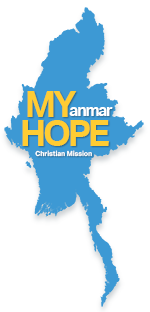Poverty
Dr. T. Lunkim, Apostle to the Kukis
By Annie Hammerlinck
Our time in Tamu (Northwest part of Myanmar), was full of memories and joy. We gathered with hundreds of Kuki people to sing songs, laugh, and talk about Jesus being Lord of our lives. We had the chance to eat lunch with Dr. T. Lunkim, the man who translated the Bible into the Kuki language for his people, and the man who put into motion the work that led to Myanmar Hope Christian Mission. We were able to walk the streets of Tamu, interact with the people in an organic way, visit the Buddhist monastery, and take pictures with young men and women wanting proof that they were in the company of white people. :-)
The average income for a family living in northwest Myanmar is $20 a month or less. (This number is a rough estimate as jobs are sparse and rare in this region.) The unemployment rate in Tamu and surrounding villages is anywhere between 85 and 90 percent. A 100 pound bag of rice costs about $30. This one bag of rice is enough to feed a family of 4 an average of 2 rice meals a day for about a month. Poverty. As we walked around the city of Tamu, we see signs of this poverty everywhere: cows in the middle of a busy street feeding on a large pile of trash, people bathing and washing laundry in the same dirty water, untreated wounds and infections on the people, and trash littering every space of land you can see. This is the harsh reality for the families in the northwest.
A general lack of infrastructure and basic services is the daily reality for most people in Myanmar.
But the people! The Kuki Christians are full of joy and faith. Joy in the midst of what seems like a hopeless situation. Their smiles are contagious, and their laughs are constant. Their worship bleeds from their souls as they sing and dance for their Jesus. Their faith is awe inspiring. Praying fervently and continually and believing without an ounce of doubt that their prayers are heard and answered. They are dedicated to a life of worship to their God, knowing and believing that He is a good God.
The Kuki people live life together. Not together like we understand together - sitting in the same room or meeting together for short, scheduled visits - but eating together, sitting and talking together for hours and hours (without a phone in their hands), singing together, and even sleeping huddled together.
A Kuki worship service
Even in the midst of their extremely low means and access to virtually zero resources, pregnancy and new life is celebrated and honored. A new baby is cause for celebration and joy, not thought of as burdensome or an inconvenience.
Their homes are filled with lots of empty space, not having the money to purchase useless (or even useful) stuff. Even still, their hospitality rivals what we would call “southern hospitality” in the west. They certainly know how to make someone feel welcome and at home.
Worship. These people know how to worship their Jesus. They sing from their souls, they dance with no embarrassment, and they have no care for what other people might think. Even the children close their eyes and speak intently and passionately to God. With barely any finances or hope for an upcoming paycheck, they even give an offering to help those in need in their community. What an image of true sacrifice - all with joy! In song, in prayer, in life these people are a true example of what worship truly looks like.
Even though they are poor in worldly wealth, the Kukis are rich in generosity.
In America, we have access to clean water - to drink, to bathe, to wash our clothes, to waste. In America, we are surrounded by stuff - both to use and to live among and take up space in our homes. In America, we have all forms of entertainment at our fingertips. In America, we have access to communicate with whomever we want whenever we want. In America, we have the luxury of job opportunities (with exceptions). In America, we do not have to worry about ourselves or our children starving to death (with exceptions). In America, we have access to band aids and soap within a 10 minute drive.
In America, we don’t live in community like these beautiful people do. In America, we put our faith in ourselves, in our money, in our healthcare system. In America, we are desperately lonely people.
So who actually is living in extreme poverty? From my perspective, the Kuki people are the richest people in the world. We have so much to learn from this “impoverished” culture and these “poor” people. In this land, my faith is strengthened and my prayers are longer. Jesus seems to exude and pour out of these people who have nothing - but still have everything.
P.S. Yes, girl! You can change the world!





